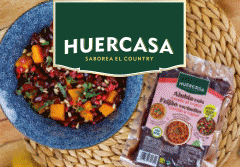Bejo has presented its sweet, wood-free variety in Moraleda de Zafayona
Last March, the team from Bejo Ibérica travelled to la Vega de Granada to present the Magnus F1 variety, a material that is the “future of asparagus”. Semi-early, with sizes above 16 millimetres and great quality in terms of closed tips and morphology, it has many characteristics that are similar to those of others present on the market. However, there are two aspects that differentiate it from the rest and they make Magnus F1 a unique variety: on the one hand, its 100% male genetics and on the other hand, its flavour and absence of woodiness, which place it within the ‘Sweet4you’ concept that Bejo has created to make its Premium varieties stand out (the best ones on an organoleptic level).
When the seed company started its asparagus development programme two decades ago, it exclusively opted for the search for 100% male plants. “They provide earlier harvesting, greater production and uniformity, greater resistance to disease and they do not generate berries or shoots, with the subsequent savings in labour,” explains Rafael de Vicente, expert in Development. The Magnus F1 plant has all these advantages and its significant climbing feature encourages aeration, preventing problems such as rust. Likewise, when developing the material, it was decided to produce it entirely in Spain, in order to ensure that the variety adapted completely to the soil.
The producers present at the open day confirmed the differential value of Bejo’s asparagus after the talk. “The variety is perfect, both in size and in production. The farm we have seen has only been operating for one year, after another two years, the production will be amazing,” a farmer from Chauchina assured Fruit Today during the visit to the fields. In the subsequent tasting, those attending confirmed that they were in the presence of a unique asparagus: sweet, crunchy and without any woodiness (even at the part close to the bottom); Magnus F1 can be eaten entirely, even raw and it leaves a delicate touch in the mouth that is reminiscent of broad beans and peas.
The only ‘snag’, its above average value compared to other varieties, is compensated over a short period of time. “In 7 years, just with the saving in labour from removing shoots, the investment in seeds is amortised.” There is also a saving in consumables thanks to the high tolerance to rust; and as it is very productive (its yield from the third year onwards is 60% greater than other varieties) and also stable and homogeneous over time, yields are obtained on dates when other varieties are faltering.
Magnus F1 is suitable for both green and white asparagus (it is the reference in northern Spain). In order to make it known on a large scale, Bejo has made a punchy promotion for this year and next.





















